#like learn different accents and patterns of speech
Explore tagged Tumblr posts
Text
When morrigan was little flemeth would say shit like "twas" and "twould" around her all the time and when she finally got older and interacted with other humans they were like "huh u talk funny" and flemeth was like fukin gottem 💀💀💀💀💀💀
#talk#JUST ANOTHER WAY TO ISOLATE HER DAUGHTER !!!!!#fr tho the difference in their speech patterns and accents is a lil jarring like morrigan has ONLY learned from u 💀#speaking of kieran would prob also say twas and twould 🥺
1 note
·
View note
Text
Sebastian Stan Tells All: Becoming Donald Trump, Gaining 15 Pounds and Starring in 2024’s Most Controversial Movie
By Daniel D'Addario
Sebastian Stan Variety Cover Story

It started with the most famous voice on the planet, the one that just won’t shut up.
Sebastian Stan, in real life, sounds very little like Donald Trump, whom he’s playing in the new film “The Apprentice.” Sure, they share a tristate accent — Stan has lived in the city for years and attended Rutgers University before launching his career — but he speaks with none of Trump’s emphasis on his own greatness. Trump dwells, Stan skitters. Trump attempts to draw topics together over lengthy stem-winders (what he recently called “the weave”), while Stan has a certain unwillingness to be pinned down, a desire to keep moving. It takes some coaxing to bring Stan, a man with the upright bearing and square jaw of a matinee idol, to speak about his own process — how hard he worked to conjure a sense Trump, and how he sought to bring out new insights about America’s most scrutinized politician.
“I think he’s a lot smarter than people want to say about him,” Stan says, “because he repeats things consistently, and he’s given you a brand.” Stan would know: He watched videos of Trump on a loop while preparing for “The Apprentice.” In the film, out on Oct. 11, Stan plays Trump as he moves from insecure, aspiring real estate developer to still insecure but established member of the New York celebrity firmament.

We’re sitting over coffee in Manhattan. Stan is dressed down in a black chore coat and black tee, yet he’s anything but a casual conversation partner. He rarely breaks eye contact, doing so only on the occasions when he has something he wants to show me on his iPhone (cracked screen, no case). In this instance, it’s folders of photos and videos labeled “DT” and “DT PHYSICALITY.”
“I had 130 videos on his physicality on my phone,” Stan says. “And 562 videos that I had pulled with pictures from different time periods — from the ’70s all the way to today — so I could pull out his speech patterns and try to improvise like him.” Stan, deep in character, would ad-lib entire scenes at director Ali Abbasi’s urging, drawing on the details he’d learned from watching Trump and reading interviews to understand precisely how to react in each moment.
“Ali could come in on the second take and say, ‘Why don’t you talk a little bit about the taxes and how you don’t want to pay?’ So I had to know what charities they were going to in 1983. Every night I would go home and try not only to prepare for the day that was coming, but also to prepare for where Ali was going to take this.”
Looking at Stan’s phone, among the endless pictures of Trump, I glimpse thumbnails of Stan’s own face perched in a Trumpian pout and videos of the actor’s preparation just aching to be clicked — or to be stored in the Trump Presidential Library when this is all over in a few months, or in 2029, or beyond.
“I started to realize that I needed to start speaking with my lips in a different way,” Stan says. “A lot of that came from the consonants. If I’m talking, I’m moving forward.” On film, Stan shapes his mouth like he can’t wait to get the plosives out, puckering without quite tipping into parody. “The consonants naturally forced your lips forward.”
“If he did 10% more of what he did, it would become ‘Saturday Night Live,’” Abbasi says. “If he did 10% less, then he’s not conjuring that person. But here’s the thing about Sebastian: He’s very inspired by reality, by research. And that’s also the way I work; if you want to go to strange places, you need to get your baseline reality covered very well.”
A little later, Stan passes me the phone again to show me a selfie of him posing shirtless and revealing two sagging pecs and a bit of a gut. He’s pouting into a mirror. If his expression looks exaggerated, consider that he was in Marvel-movie shape before stepping into the role of the former president; the body transformation happened rapidly and jarringly. Trump’s size is a part of the film’s plot — as Trump’s sense of self inflates, so does he. In a rush to meet the shooting deadline for “The Apprentice,” Abbasi asked Stan, “How much weight can you gain?”
“You’d be surprised,” Stan tells me. “You can gain a lot of weight in two months.” (Fifteen pounds, to be exact.)
Now he’s back in fighting form, but the character has stayed with him. After years of playing second-fiddle agents of chaos — goofball husbands to Margot Robbie’s and Lily James’ characters in “I, Tonya” and Hulu’s “Pam & Tommy,” surly frenemy to Chris Evans’ Captain America in the Marvel franchise — Stan plunged into the id of the man whose appetites have reshaped our world. He had to have a polished enough sense of Trump that he could improvise in character, and enough respect for him to play him as a human being, not a monster.

It’s one of two transformations this year for Stan — and one that might give a talented actor that most elusive thing: a brand of his own. He’s long been adjacent enough to star power that he could feel its glow, but he hasn’t been the marquee performer. While his co-stars have found themselves defined by the projects he’s been in — from “Captain America” and “I, Tonya” back to his start on “Gossip Girl” — he’s spent more than a decade in the public eye while evading being defined at all.
This fall promises to be the season that changes all that: Stan is pulling double duty with “The Apprentice” and “A Different Man” (in theaters Sept. 20), in which he plays a man afflicted with a disfiguring tumor disorder who — even when presented with a fantastical treatment that makes him look like, well, Sebastian Stan — can’t be cured of ailments of the soul. For “A Different Man,” Stan won the top acting prize at the Berlin Film Festival; for “The Apprentice,” the sky’s the limit, if it can manage to get seen. (More on that later.)
One reason Stan has largely evaded being defined is that he’s never the same twice, often willing to get loopy or go dark in pursuit of his characters’ truths. That’s all the more true this year: In “The Apprentice,” he’s under the carapace of Trumpiness; in “A Different Man,” his face is hidden behind extensive prosthetics.
“In my book, if you’re the good-looking, sensitive guy 20 movies in a row, that’s not a star for me,” says Abbasi, who compares Stan to Marlon Brando — an actor eager to play against his looks. “You’re just one of the many in the factory of the Ken dolls.”
This fall represents Stan’s chance to break out of the toy store once and for all. His Winter Soldier brought a jolt of evil into Captain America’s world, and his Jeff Gillooly was the devil sitting on Tonya Harding’s shoulder. Now Stan is at the center of the frame, playing one of the most divisive characters imaginable. So he’s showing us where he can go. The spotlight is his, and so is the risk that comes with it.
Why take such a risk?
The script for “The Apprentice,” which Stan first received in 2019, but which took years to come together, made him consider the American dream, the one that Trump achieved and is redefining.
Stan emigrated with his mother, a pianist, from communist Romania as a child. “I was raised always aware of the American dream: America being the land of opportunity, where dreams come true, where you can make something of yourself.” He pushes the wings of his hair back to frame his face, a gold signet ring glinting in the late-summer sunlight, and, briefly, I can hear a hint of Trump’s directness of approach. “You can become whoever you want, if you just have a good idea.” Stan’s good idea has been to play the lead in movies while dodging the formulaic identity of a leading man, and this year will prove just how far he can take it.
“The Apprentice” seemed like it would never come together before suddenly it did. This time last year, Stan was sure it was dead in the water, and he was OK with that. “If this movie is not happening, it’s because it’s not meant to happen,” he recalls thinking. “It will not be because I’m too scared and walk away.”
Called in on short notice and filming from November 2023 to January of this year (ahead of a May premiere in Cannes), Stan lent heft and attitude to a character arc that takes Trump from local real estate developer in the 1970s to national celebrity in the 1980s. He learns the rough-and-tumble game of power from the ruthless and hedonistic political fixer Roy Cohn (Jeremy Strong), eventually cutting the closeted Cohn loose as he dies of AIDS and alienating his wife Ivana (Maria Bakalova) in the process. (In a shocking scene, Donald sexually assaults Ivana in their Trump Tower apartment.) For all its edginess, the film is about Trump’s personality — and the way it calcified into a persona — rather than his present-day politics. (Despite its title, it’s set well before the 2004 launch of the reality show that finally made Trump the superstar he longed to be.)

And despite the fact that Trump has kept America rapt since he announced his run for president in 2015, Hollywood has been terrified of “The Apprentice.” The film didn’t sell for months after Cannes, an unusual result for a major English-language competition film, partly because Trump’s legal team sent a cease-and-desist letter attempting to block the film’s release in the U.S. while the fest was still ongoing. When it finally sold, it was to Briarcliff Entertainment, a distributor so small that the production has launched a Kickstarter campaign to raise money so that it will be able to stay in theaters.
Yes, Hollywood may vote blue, but it’s not the same town that released “Fahrenheit 9/11” or even “W.,” let alone a film that depicts the once (and possibly future) president raping his wife. (The filmmakers stand behind that story. “The script is 100% backed by my own interviews and historical research,” says Gabriel Sherman, the screenwriter and a journalist who covers Trump and the American conservative movement. “And it’s important to note that it is not a documentary. It’s a work of fiction that’s inspired by history.”) Entertainment corporations from Netflix to Disney would be severely inconvenienced if the next president came into office with a grudge against them.
“I am quite shocked, to be honest,” Abbasi says. “This is not a political piece. It’s not a hit piece; it’s not a hatchet job; it’s not propaganda. The fact that it’s been so challenging is shocking.” Abbasi, born in Iran, was condemned by his government over his last film, “Holy Spider,” and cannot safely return. He sees a parallel in the response to “The Apprentice.” “OK, that’s Iran — that is unfortunately expected. But I wasn’t expecting this.”
“Everything with this film has been one day at a time,” Stan says. The actor chalks up the film’s divisiveness to a siloed online environment. “There are a lot of people who love reading the [film’s] Wikipedia page and throwing out their opinions,” he says, an edge entering his voice. “But they don’t actually know what they’re talking about. That’s a popular sport now online, apparently.”
Unprompted, Stan brings up the idea that Trump is so widely known that some might think a biographical film about him serves no purpose. “When someone says, ‘Why do we need this movie? We know all this,’ I’ll say, ‘Maybe you do, but you haven’t experienced it. The experience of those two hours is visceral. It’s something you can hopefully feel — if you still have feelings.’”
After graduating from Rutgers in 2005, Stan found his first substantial role on “Gossip Girl,” playing troubled rich kid Carter Baizen. Like teen soaps since time immemorial, “Gossip Girl” was a star-making machine. “It was the first time I was in serious love with somebody,” he says. (He dated the series’ star, Leighton Meester, from 2008 to 2010.) He feels nostalgic for that moment: “Walking around the city, seeing these same buildings and streets — life seemed simpler.”
Stan followed his “Gossip Girl” gig with roles on the 2009 NBC drama “Kings,” playing a devious gay prince in an alternate-reality modern world governed by a monarchy, and the 2012 USA miniseries “Political Animals,” playing a black-sheep prince (and once again a gay man) of a different sort — the son of a philandering former president and an ambitious former first lady.
When I ask him what lane he envisioned himself in as a young actor, he shrugs off the question. “I grew up with a single mom, and I didn’t have a lot of male role models. I was always trying to figure out what I wanted to be. And at some point, I was like, I could just be a bunch of things.”

Which might seem challenging when one is booked to play the same character, Bucky Barnes, in Marvel movie after Marvel movie. Bucky’s adventures have been wide-ranging — he’s been brainwashed and turned evil and then brought back to the home team again, all since his debut in 2011’s “Captain America: The First Avenger.” Next year, he’ll anchor the summer movie “Thunderbolts,” as the leader of a squad of quirky heroes played by, among others, Julia Louis-Dreyfus and Florence Pugh. It’s easy to wonder if this has come to feel like a cage of sorts.
Not so, says Stan. His new Marvel film “was kind of like ‘One Flew Over the Cuckoo’s Nest’ — a guy coming into this group that was chaotic and degenerate, and somehow finding a way to unite them.”
Lately, knives have been out for Marvel movies as some have disappointed at the box office, and “Thunderbolts,” which endured strike delays and last-minute cast changes, has been under scrutiny.
“It’s become really convenient to pick on [Marvel films],” Stan says. “And that’s fine. Everyone’s got an opinion. But they’re a big part of what contributes to this business and allows us to have smaller movies as well. This is an artery traveling through the system of this entire machinery that’s Hollywood. It feeds in so many more ways than people acknowledge.” He adds, “Sometimes I get protective of it because the intention is really fucking good. It’s just fucking hard to make a good movie over and over again.”
Which may account for an eagerness to try something new. “In the last couple of years,” he says, “I’ve gotten much more aggressive about pursuing things that I want, and I’m constantly looking for different ways of challenging myself.”
The challenge continued throughout the shoot of “The Apprentice,” as Stan pushed the material. “One of the most creatively rewarding parts of the process was how open Sebastian was to giving notes on the script but also wanting to go beyond the script,” says Sherman, the screenwriter. “If he was interested in a certain aspect of a scene, he was like, Can you find me a quote?” he recalls.
Building a dynamic through improvised scenes, Stan and Strong stayed in character throughout the “Apprentice” shoot. “I was doing an Ibsen play on Broadway,” says Strong, who won a Tony in June for his performance in “An Enemy of the People,” “and he came backstage afterwards. And it was like — I’d never really met Sebastian, and I don’t think he’d ever met me. So it was nice to meet him.”
Before the pair began acting together, they didn’t rehearse much — “I’m not a fan of rehearsals,” Strong says. “I think actors are best left in their cocoon, doing their work, and then trusted to walk on set and be ready.” The two didn’t touch the script together until cameras went up — though they spent a preproduction day, Strong says, playing games in character as Donald and Roy.
After filming, both have kept memories of the hold their characters had on them. They shared a flight back from Telluride — a famously bumpy trip out of the mountains. “He’s a nervous flyer, and I’m a nervous flyer,” Stan says. Both marveled at the fact that they’d contained their nerves on the first day of shooting “The Apprentice,” when their characters traveled together via helicopter. “We both go, ‘Yeah — but there was a camera.’”
Stan’s aggressive approach to research came in handy on “A Different Man,” which shot before “The Apprentice.” His character’s disorder, neurofibromatosis, is caused by a genetic mutation and presents as benign tumors growing in the nervous system. After being healed, he feels a growing envy for a fellow sufferer who seems unbothered by his disability.
Stan’s co-star, Adam Pearson, was diagnosed with neurofibromatosis in early childhood. Stan found the experience challenging to render faithfully. “I said many times, I can do all the research in the world, but am I ever going to come close to this?” Stan says. “How am I going to ever do this justice?”
Plus, he had precious little time to prepare: “He was fully on board, and the film was being made weeks later,” director Aaron Schimberg says. “Zero to 60 in a matter of weeks.”
The actor grappled for something to hold on to, and Pearson sug gested he refer to his own experience of fame. “Adam said to me, ‘You know what it’s like to be public property,’” Stan says.

Pearson recalls describing the experience to Stan this way: “While you don’t understand the invasiveness and the staring and the pointing that I’ve grown up with, you do know what it’s like to have the world think you owe them something.”
That sense of alienation becomes universal through the film’s storytelling: “A Different Man” takes its premise as the jumping-off point for a deep and often mordant investigation of who we all are underneath the skin.
The film was shot in 22 days in a New York City heat wave, and there was, Schimberg says, “no room for error. I would get four or five takes, however many I could squeeze out, but there’s no coverage.”
Through it all, Stan’s performance is utterly poised — Schimberg and Stan discussed Buster Keaton as a reference for his ability to be “completely stone-faced” amid chaos, the director says. And the days were particularly long because Oscar-nominated prosthetics artist Michael Marino was only able to apply Stan’s makeup in the early morning, before going to his job on the set of “The Marvelous Mrs. Maisel.”
“Even though I wasn’t shooting until 11 a.m., I would go at like 5 in the morning to his studio, or his apartment,” Stan recalls. The hidden advantage was that Stan had hours to kill while made up like his character, the kind of person the world looks past. “I wanted to walk around the city and see what happened,” Stan says. “On Broadway, one of the busiest streets in New York, no one’s looking at me. It’s as if I’m not even there.” The other reaction was worse: “Somebody would immediately stop and very blatantly hit their friend, point, take a picture.”
It was a study in empathy that flowed into the character. Stan had spoken to Pearson’s mother, who watched her son develop neurofibromatosis before growing into a disability advocate and, eventually, an actor. “She said to me, ‘All I ever wanted was for someone to walk in his shoes for a day,’” Stan recalls. “And I guess that was the closest I had ever come.”
“The Apprentice” forced Stan, and forces the viewer, to do the same with a figure that some 50% of the electorate would sooner forget entirely. And that lends the film its controversy. Those on the right, presupposing that the movie is an anti-Trump document, have railed against it. In a statement provided to Variety, a Trump campaign spokesman said, “This ‘film’ is pure malicious defamation, should never see the light of day and doesn’t even deserve a place in the straight-to-DVD section of a bargain bin at a soon-to-be-closed discount movie store, it belongs in a dumpster fire.” The campaign threatened a lawsuit, though none has materialized.
Asked about the assault scene, Stan notes that Ivana had made the claim in a deposition, but later walked it back. “Is it closer to the truth, what she had said directly in the deposition or something that she retracted?” he asks. “They went with the first part.”
The movie depicts, too, Ivana’s carrying on with her marriage after the violation, which may be still more devastating. “How do you overcome something like this?” asks Bakalova. “Do you have to put on a mask that everything is fine? In the next scene, she’s going to play the game and pretend that we’re the glamorous, perfect couple.” The Trumps, in “The Apprentice,” live in a world of paper-thin images, one that grows so encompassing that Donald no longer feels anything for the people to whom he was once loyal. They’re props in his stage show.
“The Apprentice” will drop in the midst of the most chaotic presidential election of our lifetime. “The way it lands in this extremely polarized situation, for me as an artist, is exciting. I won’t lie to you,” says Abbasi.
When asked if he was concerned about blowback from a Trump 47 presidency, Stan says, “You can’t do this movie and not be thinking about all those things, but I really have no idea. I’m still in shock from going from an assassination attempt to the next weekend having a president step down [from a reelection bid].”
Stan’s job, as he sees it, was to synthesize everything he’d absorbed — all those videos on his phone — into a person who made sense. This Trump had to be part of a coherent story, not just the flurry of news updates to which we’ve become accustomed.
“You can take a Bach or a Beethoven, and everyone’s going to play that differently on the piano, right?” Stan says. (His pianist mother named him for Johann Sebastian Bach.) “So this is my take on what I’ve learned. I have to strip myself of expectations of being applauded for this, if people are going to like it or people are going to hate it. People are going to say whatever they want. Hopefully they should think at least before they say it.”
It’s a reality that Stan is now used to — the work is the work, and the way people interpret him is none of his business. Perhaps that’s why he has run away from ever being the same thing twice. “I could sit with you today and tell you passionately what my truth is, but it doesn’t matter,” he says. “Because people are more interested in a version of you that they want to see, rather than who you are.”
“The Apprentice” has been the subject of extreme difference of opinion by many who have yet to see it. It’s been read — and will continue to be after its release — as anti-Trump agitprop. The truth is chewier and more complicated, and, perhaps, unsuited for these times.
“Are we going to live in a world where anyone knows what the truth is anymore? Or is it just a world that everyone wants to create for themselves?” Stan asks.
His voice — the one that shares a slight accent with Trump but that is, finally, Stan’s own — is calm and clear. “People create their own truth right now,” he says. “That’s the only thing that I’ve made peace with; I don’t need to twist your arm if that’s what you want to believe. But the way to deal with something is to actually confront it.”
#Variety#Sebastian Stan#Photoshoot#A Different Man#The Apprentice#Thunderbolts*#Marvel#Interview#mrs-stans
271 notes
·
View notes
Text
Ace Trappola Headcanons
Some of my list of Ace headcanons because why not
He has a slight accent with certain words he says and has a different speech pattern depending on who he's talking to
Has scars on his left hand from a mysterious injury and hides them with his glove on regular school days. If he doesn't have his glove, he's using either makeup or a glamor spell he learned from his brother
He doesn't have many friends back home, but the ones he does have are just as playful and mischievous as he is
Ace learned to count cards and is a master at rigging card decks in any player's favor. He learned by watching his brother and father
Even though he doesn't talk about her much, I think Ace adores his mother and his mother favors him over his brother. On the flipside, Ace's father favors his brother but overall everyone has a good standing with each other
Ace doesn't really like kids all that much, but he's really good at taking care of them and has babysat for neighbors a few times
He and his ex-girlfriend are actually on good standing with each other and they still talk fairly frequently
He's a little insecure about his red eyes and thinks that people might think he's evil (thanks cartoons). It also separates him from his brother and father who both have more orange eyes
He's actually very smart but doesn't like applying himself
Ace is secretive for no reason. One of his friends will ask him a very general question like "What are you doing?" or "Where are you going?" and he will just not give them a straight answer. Just a very private person
He is very accepting of other's sexualities and gender identities and everyone thinks he's just an ally. Yuu is the only person at NRC who knows he isn't straight
Despite his attitude that draws attention to himself, he doesn't like being in the spotlight and deflects any unwanted attention onto someone else (birthdays are a nightmare for him)
He fidgets with his glove when he's nervous/anxious/restless and if he isn't wearing his glove, he plays with a deck of cards
Ace's favorite card games are Black Jack, Hearts, Speed, and Poker (Texas Hold 'em)
Ace's family is full of magicians and illusionists and Ace knows almost every trick in the book
I don't think Ace knows exactly what he wants to do when he graduates and he's mostly going to NRC just because his brother did
Sometimes he's found just sitting alone somewhere super random just staring off into space and/or just wandering the halls if he's bored (cryptid)
He genuinely doesn't have a favorite friend. He'd lose his shit if any of them disappeared suddenly
Ace comes off as a coward and only seems like he wants to protect himself, but the moment you insult anyone he cares about his fists start flying (Riddle is painfully aware of this)
He bottles up a lot of his emotions until he literally can't hold in every thought he's ever had
His music taste consists of anything but country and classical music and always fights Epel and Sebek if one of them offers to take control of the playlist
He's very good at spotting liars and after the Playful Land event he was beating himself up a lot over not being able to see that Ernesto was playing them
Sometimes Ace just shows up at Ramshackle and it doesn't matter what time he does (it could be 4am or 3pm it doesn't matter), Yuu always lets him in and they always watch reality TV
Ace is secretly a really good artist but hasn't shown anyone his drawings
#ace trappola#twisted wonderland#headcanon#my shayla my shayla#I love this lil guy he's my son#ace trappola headcanon
78 notes
·
View notes
Text
Scottish!Yuu
General Reactions
Grim:
“I dunno what half the things yer sayin’ mean, but I like the way ya talk!”
Tries to mimic Yuu’s accent but ends up sounding like a strangled cat.
Loves when Yuu calls him “wee beastie.”
The NRC Student Body:
70% of the time, they have no idea what Yuu is saying.
“What do you mean ye ‘pure dingied’ someone?”
“Why did you just call that guy a ‘weapon’? Is that good or bad?”
Confusion intensifies.
Crowley:
Tries to use Scottish slang to be relatable. Fails miserably.
“Ah, Prefect, ye are quite the mad rocket, aren’t ye?”
Yuu: “Crowley, that’s not how it works.”
Individual Reactions
Riddle:
“STOP CALLING ME ‘WEE MAN.’”
Gets mad when Yuu calls him a “roaster” but doesn’t understand what it means.
Is personally offended when Yuu calls tea “boggin’” if it’s not made properly.
Leona:
Absolutely lives for Yuu’s casual insults.
“Ye absolute tube.”
“Heh. That’s a new one.”
Once Yuu explains what a “bam” is, he immediately starts calling Ruggie one.
Azul:
Hears Yuu use three different slang words in one sentence and short-circuits.
“What... what does any of that mean?”
Secretly loves that Yuu takes their food very seriously.
Jade:
“Ah, Prefect, you have quite a fascinating dialect.”
Purposely mispronounces things to watch Yuu get mad.
Lowkey interested in haggis just to see Yuu’s reaction.
Floyd:
“Hahahaha! Shrimpy sounds so funny when they’re mad!”
Purposely winds Yuu up just to hear them rant in full-blown Scottish fury.
“C’mon, say ‘pure raging’ again!”
Kalim:
“Wow, your accent is so cool! Say something else!”
Is fascinated by kilts. “You guys just wear skirts and own it? That’s awesome!”
Jamil:
Watches in horror as Yuu drinks Irn-Bru instead of water.
“That’s not healthy.”
Secretly finds Yuu’s stubbornness admirable.
Vil:
Deeply offended by Yuu’s casual approach to fashion.
“You call that an outfit?”
“Mate, it’s freezin’, I’m no wearin’ fancy clothes.”
Nearly dies when Yuu rolls up to class in a football (soccer) jersey and trackies.
Epel:
Finally, someone more incomprehensible than him.
“HAH! Now ya know how I feel!”
They just insult each other in thick accents, and no one knows if they’re fighting or bonding.
Rook:
“Ah, mon ami, your language is truly an art form!”
Recites Scottish poetry randomly just to mess with Yuu.
Calls them “my fierce Highland warrior.”
Idia:
“Wait... your country just randomly has huge men throwing logs for fun?!”
Is terrified when Yuu describes the Highland Games.
“And that’s normal???”
Ortho:
Scans Yuu’s speech patterns and still can’t understand half of it.
“Would you like me to generate subtitles for you, Prefect?”
Malleus:
Delighted by Yuu’s old folklore stories.
“Tell me more of these ‘kelpies’ and ‘selkies.’”
Is weirdly happy when Yuu calls him “big man.”
Lilia:
“Och, I love Scottish music!” Proceeds to play the bagpipes terribly.
Tries to cook haggis. Fails horribly.
“LILIA, THAT IS NOT HAGGIS.”
Sebek:
Screams. Yuu screams back. They have a shouting match for no reason.
“WHY DO YOU TALK LIKE THAT?!”
“WHY DO YOU TALK LIKE THAT?!”
Staff Reactions
Crewel:
Impressed by Yuu’s bold attitude.
However, if they call him “mate” one more time, they’re getting detention.
Trein:
Interested in Scotland’s history.
Lucius loves that Yuu calls him “wee man.”
Sam:
Immediately starts selling Irn-Bru at his shop.
“Got some Scottish snacks just for you, my friend~”
Event Character Reactions
Neige:
“Wow! You’re so passionate!”
Tries haggis. Regrets it instantly.
Chenya:
Loves Yuu’s chaotic energy.
Steals their scarf and disappears into the night.
Rollo:
“Your people do what for fun?!”
Faints after hearing about deep-fried Mars bars.
Meleanor & Lilia (when younger):
Meleanor thinks kilts are amazing.
Young Lilia fully supports bagpipe music.
More Random Scottish Yuu Moments
Crowley bans Yuu from using slang because no one understands them.
They start a full-on war over who makes the best whiskey.
Jack learns about sheepdogs and becomes obsessed.
They have an iron liver when it comes to strong drinks.
Punches the first person who insults their football team.
#twst x reader#twst#twst wonderland#twst yuu#twst incorrect quotes#twst headcanons#culture!yuu#scottland
121 notes
·
View notes
Note
Hi there, just wondering if this is the right place to discuss the time that Sebastian Vettel made the drivers build bee hotels in Japan and Lance says ‘it’s nice no?’ in the same way that Fernando would say it. Hmmm. Much to think about.
Yes you have come to the right place my friend. I too found it really endearing 😊
This is pretty common for anyone like him who grow up/spend time around people with a lot of different accents and speech patterns. It's called linguistic convergence under the accommodation theory - how people adjust their accent, diction, or other aspects of language according to the speech style of the other participants/their surroundings.
Lance is really interesting because from up until he signed with Prema he had a British karting coach. I particularly adore this interview from 2012 where you can really hear it. It stills shows even now if you listen here when says "on my gearbox".
I wouldn't be surprised if Nuno, who Lance has been with for over a decade, has had an impact on certain words he says in the romance languages. Not to mention the FDA effect as I like to call it, and then having Checo/Fernando as a teammate.
Even his upbringing kinda similar since he's obviously an anglophone who learned French as a second language just by being in Quebec. Like his baby french in this interview. Anyways a very longwinded explantation of why. But hey I'm open to the spanish kink theory idea.
Further Reading Phonetic convergence in spontaneous conversations as a function of interlocutor language distance The Chameleon Effect Anticipation and accents: Talking like a southerner even if you're not
80 notes
·
View notes
Note
Was it confirmed that Acht speaks inklish in bancala or anywhere else? In a post, you also mentioned the accent being an intentional tone. Is it a mix of both tone and octarian accent or explicitly just the tone?
I hope this ask doesn't sound too confusing. I wanted to make a note of how Acht comes off in speech. Thank you.
short answer: there’s no canon info specifying whether Acht speaks the inkling language. however, in the JP version, Acht speaks in a similar way to other Octarian characters, with said specific way of speaking for these other characters very likely denoting accented speech. but...
long answer:
using katakana, which is otherwise used for loanwords and foreign names (in modern times) for words that are written in hiragana/kanji gives a feeling of "difference". it’s very commonly used to denote accented speech or a foreign language in media. examples of its usage by Octarian characters that canonically originate from the domes:
(1) DJ Octavio:
throughout all three games, DJ Octavio speaks in all katakana, and seemingly in a slow, deliberating way, as every word is separated by a space (rather than a space after a few words like with the rest of splatoon's text, which is instead of no spaces like normal JP writing, which is likely done for readability purposes)
サイキン シモベタチガ シッソウ シテイタハ
(2) Marina:
how Marina speaks in the JP version has been fairly well-documented, but just in case: she speaks in the polite keigo, specifically teinei-go; the literal textbook Japanese that people learning it as a second language are first taught. however, she uses tame-guchi/casual speech with Acht exclusively (in both Side Order and #3-etude), and it’s unknown whether she used it with her other Octarian peers. she also very occasionally uses katakana for some words that are otherwise written differently.
side note: her lyrics in Off the Hook are written in katakana, and are canonically in the “octo language” (イイダが歌うタコ語はカタカナになっている).
the JP version of Octo Expansion explicitly states that Marina spoke in “broken Inkling” when she first met Pearl (more directly translated version here). Marina’s "let's start a band” quote as per Pearl:
MC Princess >思い出した!山でノドのウォームアップしてたらいきな り「アナタ探シテタユニット組ミタイ」って言われて、ストーカーかと 思ったわ
is written in all katakana besides the kanji portions, and is more blunt than the teinei-go we see her using otherwise.
(3) Agent 8:
as a silent protagonist, Agent 8 obviously doesn’t get a lot of opportunities for dialogue, but there are some. their Mem Cake poems are all written normally. however, in both of their relationship charts, they speak in full katakana with spaces between every word.


スゴイ センパイタチ
(4) Acht, in chronological order:
#3-etude: narrates and speaks with no katakana (*)
Side Order: uses katakana instead of the hiragana for sentence endings, as well as inconsistently using katakana for nouns/adjectives/verbs/etc. in both spoken dialogue and the letters they write to Marina. some examples:
イイダは外に出て 良い仲間に出会えたようダナ ...ま、カノジョのコトだし、心配はしてなかったケド
カラーチップは、その結果によっていくつかの系統に分けられル系統ごとに 色や模様もチガウんダ
Ordertune: writes with no katakana
considering all the above examples, it’s easy to imagine that they’re speaking the Inkling language in Side Order, as they’d obviously be speaking the Octarian language in #3-etude. however, their speech patterns are rather casual/laid-back and don't have the faltering nature of other examples. it’d also make you wonder when Acht would’ve had the opportunity to learn the Inkling language before being sanitized, since Marina needed to be taught it by Pearl. the fact that it isn’t present in Ordertune could be a reflection of it being written rather than spoken meaning that an accent wouldn’t express itself… but they do use it in their written letters to Marina (I guess it could indicate they improved at the language that much in a short amount of time)
(if it doesn't represent an accent or different language, than it'd still beg the question of what language they're all using in the elevator... and this is probably going beyond the scope of the question, but maybe Marina is really enough of a genius to design the Memverse in such a way that anything said can transcend language barriers?)
there’s other examples of atypical katakana usage that likely represent an accent besides Octarian characters (jellyfish store owners, Spyke and Murch), but also likely other distinct usages (Tartar, as robot characters speaking in katakana in media is a staple. also whatever reason Frye's lyrics are written in katakana). the few line of dialogue from sanitized Octarian enemies in Octo Expansion are written in all katakana:
タイショウヲ カクニン... シマツセヨ
So finally getting to that asterisk: despite no other atypical katakana usage throughout #3-etude, the very final line is this:
イイダがボクたちの前から姿を消したのは、それから少しだけ後の話ダ。
a single katakana sentence ending finding its way in, as Acht narrates on how Marina would soon leave all of their lives. considering the subject matter of where this comes up, it makes me view their katakana usage as chiefly representing their hollowness post-sanitization, which they're eventually able to start recovering from. though ultimately that's just my interpretation.
126 notes
·
View notes
Note
Here’s a break from all the cartoon/media you’ve watched accusations - and if this has been answered before I apologize - but what does your human!bill sound like? Does he have his normal voice or is it different? this been itching at my brain for a while trying to picture if he has a “human female voice” or if he just sounds like a less distorted/demonic version of himself
it has, but lucky you that means I've got links.
same voice, no echo effect.
Do you know what biological factor makes a human voice sound "female" (because only Bill's biology has been changed)?
The pitch.
if it's high that's considered the "girl voice" range.
Bill's voice is already high, in canon. It did not change. It did not need to change. You know a million AFAB folks whose natural voices are the same pitch as Bill's or even lower. Mabel's voice is around the same pitch as Bill's. Wendy's voice is deeper than Bill's.
everything else that makes a voice sound "feminine" (or "masculine") is determined by HOW you've learned to talk and use your voice. How clearly do you articulate your syllables. Is your voice more sing-song or monotone. Etc. THAT is what genders a voice in people's minds.
And why would Bill's speech patterns change just because he got shoved in a fresh human body?
If you were stuck in a parrot's body do you think you'd spontaneously develop a French accent? No—you'd sound like a parrot speaking with YOUR accent.
so, in other words: he has a """human female voice,""" which means he sounds the same way he always has.
51 notes
·
View notes
Note
Hi! I've seen some posts going around about Epel's accent and Vil correcting him. From what I gathered Epel has a pretty farmland accent that can be basically indecipherable so Vil being hard on him for it is both 'this is kind of casual' and 'i have no idea what you're saying' but could still be kind of elitist/classist. But I see some people saying Vil is just correcting Epel because he's swearing a lot?
Thank you so much for this question! Reading through just the EN adaptation of Book 5, I think I can understand why people might be annoyed by Vil’s wording: in English, he says outright that Epel should “speak properly,” as if his natural dialect is somehow improper and objectively “wrong.”

But his original line is closer to, “Speak more politely”! (The translations in these images are just more literal rewordings of the original dialogue, not meant to be corrections or improvements over EN’s localization)
I think the game was aware of the risk it was taking by having Vil give such an order, which is why it has Epel immediately jump to that assumption himself, so that Vil can explain it is not Epel’s hometown pride he has an issue with, but rather the outdated mindset that comes with it.
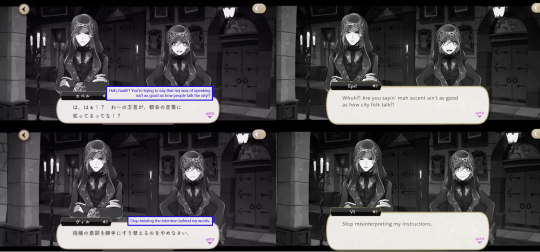

While softened on EN, Epel is quite misogynistic in the original game. He also repeats the same insult three times, possibly as an example of his limited vocabulary, which is another of Vil’s projects.



While Epel does say that Vil has told him not to use the accent specifically, Vil explains that he just wants him to consider the time, place and occasion for it.

Question: But then why does Vil order him to drop the accent entirely if the only problem is that he’s speaking rudely? Surely he can just speak politely while keeping his accent?
Answer: There is another layer to this that is more difficult to explain in English, but I shall try!
The Japanese language has multiple verb forms that change depending upon who you’re talking to at the time. “Meshiagaru,” “taberu” and “kuu” are three different ways to say “eat,” for example, depending on how polite you want to be.
In the beach scene (and anywhere we get his Harveston dialect), Epel immediately shifts into casual/impolite verb forms.

I searched for the most formal interaction involving characters speaking in the Harveston dialect that I could find (where the mayor is apologizing to Marja), and even there, the character was using casual/informal verb forms.
So that is what Vil is actually getting at: he wants Epel to use polite speech around his senpai and teachers, but Epel’s original dialect might just not adhere to that system.
The Harveston dialect clearly has its own ways to denote politeness, which must make sense when you’re there, but outside of Harveston what is a harmless and natural way of speaking becomes offensive from the perspective of everyone else (when Marja adapts her speaking patterns so that the visiting NRC students can understand her, she uses polite forms).

Not able to have a student from his dorm obliviously insulting everyone around him through his verb forms, Vil bans Epel’s accent entirely, presumably so that Epel can grow more accustomed to interacting with people from other countries and then learn to judge for himself the times, places and occasions outside of Harveston where that degree of informality is appropriate :>
(Omake: I conferred with an American friend who told me it sounds like this is the opposite of how things are in the US, where sometimes it is assumed that people from more rural communities use more polite speech (using "sir" and ma'am") than people in cities, so they visit cities and are surprised by forms are expression that are considered rude where they come from. This is the same, but backwards! Epel is going from a laidback rural village to a more populated location where polite speech is expected of everyone, and is experiencing culture shock as a result.)
440 notes
·
View notes
Text
Crafting Character Voices And Distinct Dialogue
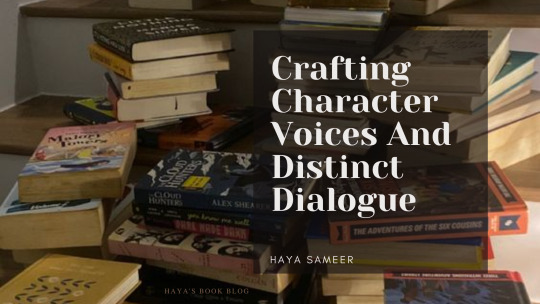
A well-crafted character voice can breathe life into your narrative, making readers feel as if they're eavesdropping on real people. Each character's dialogue should be as distinctive as their fingerprints, reflecting their personality, background, and motivations.
Creating distinctive character voices is one of the first things I learned in my creative writing lessons. Whether you're a seasoned writer or just starting, understanding how to create authentic and unique character voices is a crucial skill. So, here’s my guide on how to personalise your dialogue.
Understanding Your Characters
To craft dialogue that resonates, you must first get to know your characters inside and out. Dive deep into their psyche, exploring their backgrounds, beliefs, values, and desires. What drives them? What keeps them up at night? Understanding these intricacies is the foundation upon which you'll build their unique voices.
Additionally, consider their primary language or dialect. A character from Italy, for example, might have a different vocabulary and speech patterns than someone from India. For instance, an Italian character may use phrases or expressions unique to their culture, adding depth and authenticity to their voice. This not only provides cultural richness but also enhances the character's individuality.
Creating Distinctive Speech Patterns
Once you've delved into your characters' backgrounds and cultural influences, it's time to work on their speech patterns. Think of this as giving each character their own linguistic fingerprint. Here are some key elements to consider:
Unique Vocabulary: Each character should have a vocabulary that reflects their education, interests, and experiences. A well-read character might use more complex words, while a simpler character may prefer everyday language.
Sentence Structures: Pay attention to how characters structure their sentences. Some may favor long, flowing sentences, while others opt for brevity. This reflects their thought processes and personality.
Idioms and Colloquialisms: Characters from specific regions or backgrounds might use regional idioms or colloquial expressions. For example, a Texan character might say, "fixin' to" instead of "intending to."
Influences from Native Language: If your character speaks more than one language, consider how their native language influences their speech in another language. They might occasionally switch to their native language for emphasis or use idiomatic expressions from that language.
Accents and Pronunciation: If your character has a distinct accent, consider how this affects their pronunciation of words. You can subtly convey accents through dialogue without overdoing it, using phonetic spelling sparingly.
Tone Tags: Incorporating tone tags (e.g., nervously, confidently, sarcastically) can convey the character's emotions and attitudes during a conversation. These tags help readers understand the subtext of the dialogue.
Imagine a character named Maria, who hails from Mexico. She might use Spanish phrases when speaking English to emphasize her cultural background. Her speech could be peppered with warmth and expressions of hospitality, reflecting her upbringing.
Dialogue Tags and Character Expressions
Dialogue tags and character expressions are invaluable tools for conveying the nuances of character voices. They add layers to your characters' speech, giving readers insight into their emotions, intentions, and personalities.
While "said" is often your best friend because it's unobtrusive, don't hesitate to mix in other tags to convey mood and tone. For instance, instead of always using "said," consider alternatives like "whispered," "shouted," "murmured," or "replied." Choose tags that align with the character's demeanor and the context of the conversation.
Character expressions and actions:
Non-Verbal Communication
Beyond dialogue tags, describe how characters express themselves physically while speaking. Actions, gestures, and facial expressions can reveal a lot about a character's emotional state or their intentions. If a character nervously tugs at their collar while speaking, it conveys anxiety. If another character smirks while delivering a line, it hints at their amusement or mischief.
Using tone tags:
Incorporate tone tags like "nervously," "confidently," "sarcastically," or "gently" to clarify the character's tone of voice. These adverbs provide crucial context to the dialogue, helping readers understand the character's emotional state.
Social Influence
Remember that a character's social background can significantly influence their speech. For instance, a character from a wealthy background might use more formal language and have a refined way of speaking. They might avoid slang or contractions. In contrast, a character from a less privileged background might use colloquialisms, contractions, and have a more relaxed speech style.
Balancing character expressions and tags can breathe life into your dialogues, making them engaging and memorable for readers. Use them strategically to punctuate and emphasize key moments in your characters' conversations.
Balancing Consistency and Evolution
As you craft your characters' dialogue, it's crucial to strike a balance between consistency and evolution. Characters should maintain their unique voices throughout the story, but they can also grow and change.
Consistency is key to character integrity. Readers should be able to recognize a character's voice from the beginning to the end of your story.
To achieve this create a character profile that includes detailed notes on their speech patterns, vocabulary, and idiosyncrasies. Refer back to your character profile whenever writing dialogue to ensure you stay true to their voice.
However, characters, like real people, can evolve and change over time. Events, experiences, and personal growth can influence how they speak. To reflect this evolution gradually introduce changes in their speech as they undergo character development. You can also use dialogue to convey their changing perspectives, priorities, or emotions.
For example, a shy character might start using more assertive language as they gain confidence throughout the story. Their evolution should feel natural and in line with their character arc.
By maintaining consistency while allowing for evolution, you can create dynamic and believable character voices that resonate with your readers.
Dialogue Exercises and Practice
First things first, get to know your characters like you're catching up with an old friend. Dive into their quirks, fears, what makes them tick, and what ticks them off. Once you've got a handle on that, it's time to let them speak their minds. Ever heard of character monologues? It's like giving your characters a stage to shine. Let them ramble, vent, or reminisce—it's like therapy for both you and your character.
Now, let's talk duets. Imagine pairing up two characters from different walks of life for a conversation. It's like a linguistic showdown, and you're the ringmaster. See how they bounce off each other, and you'll bring out their unique voices like a pro.
Last but not least, voice journals. Think of it as a diary for your characters. Let them jot down their innermost thoughts and feelings. It's like having a backstage pass to their minds.
Remember, mastering character dialogue is a journey, not a sprint. Your characters will evolve, and so will your knack for making their voices stand out.
Avoiding Stereotypes and Clichés
When creating character voices it's important to avoid those clichéd, overused character stereotypes. We've all seen them: the tough-as-nails detective with a whiskey habit, or the ditzy cheerleader who cares more about lipstick than world affairs.
As writers, our mission is to create characters that feel fresh, real, and relatable. So, let's steer clear of the tired old tropes and explore the vast spectrum of humanity.
Instead of falling into the trap of predictable character traits, dig deeper. Ask yourself: What makes your character tick? What are their quirks and passions? Sure, your character might be a brilliant scientist, but what sets them apart from every other lab coat-wearing genius out there?
Diversity is your friend here. Embrace the rich tapestry of human experiences and backgrounds. Give your characters unique voices that reflect their individuality, and you'll create characters that resonate with readers on a whole new level.
I hope this blog on Crafting Character Voices will help you in your writing journey. Be sure to comment any tips of your own to help your fellow authors prosper, and follow my blog for new blog updates every Monday and Thursday.
Looking For More Writing Tips And Tricks?
Are you an author looking for writing tips and tricks to better your manuscript? Or do you want to learn about how to get a literary agent, get published and properly market your book? Consider checking out the rest of Haya’s book blog where I post writing and publishing tips for authors every Monday and Thursday! And don’t forget to head over to my TikTok and Instagram profiles @hayatheauthor to learn more about my WIP and writing journey!
#hayatheauthor#haya's book blog#haya blogs#writers on tumblr#writer community#writer tools#writer blog#writer stuff#writer wednesday#writer tips#creative writing#writers of tumblr#writerscommunity#writeblr#writing community#writer spotlight#writer things#writing prompt#writing tools#writing stuff#writing#writing life#writing inspo#writing help#writing advice#writing inspiration#writing ideas#writing things#writing tip
472 notes
·
View notes
Text
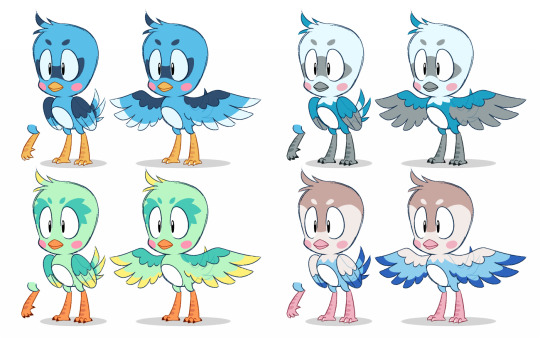
Probably not gonna post too much more while I work on this headcanon ref sheet since it's gonna pretty big, but here's a snippet of what I have so far. These are known as the "Common Flicky", the most abundant Flicky type found around Mobius in the wild. They're highly intelligent and are also considered companion birds for some Mobians that can learn mimicked speech like a parrot. They come in the greatest variety of color patterns, but mostly stick to the blue to light green range with a third and/or fourth accent color. They're Dr. Eggman's favorite animal to capture on a consistent basis due to their high population density and even higher energy reserves to power his badniks. Overall there are currently 4 well known species of Flickies documented that have different body shapes and color palettes depending on region, temperament and abilities i'll be exploring later.
#sonic#sonic the hedgehog#sth#flicky#flickies#flicky bird#sonic flicky#bird#birds#color concept#character concept#right two color palettes are based on real birds#my art
571 notes
·
View notes
Note
In FnF, Silco spent a long time with Sevika and Nandi. You've mentioned he used to visit the Equinox Bazaar and haggle with the vendors. Does Silco speak Vekauran? How many languages besides Va-Nox can he speak? Also I'd love to know how you picked out the languages each character uses!
<3
I based all the languages in FnF on RL equivalents (as does League to an extent - Va-Nox is literally described as "German spoken through a mouthful of mashed potatoes" lmao).
In FnF, the most common language spoken in Zaun is the Piltovan dialect.
i.e Standard,
i e. English.
It is the common language of both cities, and used widely for trade overseas as a commercial lingua franca. Zaun, meanwhile, has its own unique patois in League lore, so I built upon that to create a sort of a fluid vernacular that borrows from different languages/dialects/slangs/syntax in FnF. (A little modern netizen jabber, a little Victorian slang, a little Mancunian, a little Roaring 20s etc)
With that in mind, I decided to base Vekauran on Hindi (given it's the home of champions like Akshan, who is pretty Bollywood-inspired in his look). Nandi and Sevika both grew up speaking Vekauran at home. But they don't have the same amount of exposure to the language; Nandi is described as having an accent when she speaks in Standard (I headcanon her as sounding similar to the actress Ashwarya Rai in this interview). After she lost her hearing, she still retained those speech patterns, having been so enmeshed in that community (folks can still have an accent even if they're hearing-impaired because they'll focus on vocal patterns and mouth movements of others around them and can retain the accent as a result).
Sevika, on the other hand, speaks fluent Standard with zero accent, but is deeply rusty at Vekauran, having run in completely different circles. Her grammar's a bit off. She struggles with the pronunciation of certain words. She can curse up a storm, but she can't do formal greetings, honorifics or small talk to save her life. Poor woman understands more than she can speak.
(Very much a third gen immigrant vibe - and it causes her no small amount of distress because her sister was the Priestess, a storyteller, poetess, and a master of the old tongue, so she feels she has to measure up to the legacy.)
Silco grew up speaking Standard, Va-Nox and Ur-Nox. His mother was from a Noxus-colonized settlement in Ionia, so she spoke that tongue at home, and could barely read or write in Standard. Also they lived in an area full of other Va-Nox-speaking families (Vander's mom was also from a nearby region, so the boys literally shared a common language and bonded over that) and it was a pretty insular community.
Silco's father was of old Oshra va'Zaun stock and spoke Ur-Nox (the ancient precursor to Va-Nox, so similar to Middle German in FnF). He was a Riverman by trade, but well-educated as his family had been part of the intelligentsia and the merchant elite before the Cataclysm. He was the one who taught Silco his letters and made sure he knew his history. After Silco entered the orphanage, he was exposed to a wide array of dialects, so picked up a smattering of everything along the way. In Holle Correctional Facility, his warden, Jonah Lascelles, spoke East Demacian (French in FnF) as well as sign language, so Silco, for three years, was immersed in that dialect, learning both at the same time. He was a fast mimic with a near-uncanny ear for accents. After moving Topside for his stint in the Academy, he picked up the Piltovan manner of speaking (and learnt to mask his working-class accent).
By the time he was a grown man, he was a code-switching chameleon who could pass as a businessman in the streets or a thug in the sheets.
However.
He can't, for the life of him, master Vekauran. Those 'R's roll too much. The consonants pop like bubble wrap. The 'D's are weird. He's got no ear for it, and that frustrates the shit out of him because Nandi could get very expressive and animated (especially in bed), and he had no idea what she was saying half the time.
("Is she cursing? Is she sighing sweet nothings? Is she singing me a nursery rhyme? What?")
("Hush," Nandi says, seeing his confusion and peppering his face with kisses. "I'll teach you.")
(It never happens, alas.)
By this stage in FnF, he can hold a basic conversation with Sevika, and his understanding is passable. His speech patterns are hella stiff, his gramma's off, and the pronunciation is your equivalent of the typical Brit with a very, very posh accent ordering a chicken curry at a Leicester Tipu Sultan.
(Sevika thinks he sounds like a complete twat. But it's kinda cute how hard he tries, so she tolerates it. For a while. )
He does have a favorite Vekauran curseword tho.
"Bhenchod" - lit. "Sister-fucker" in Hindi.
First time he heard Sevika use it, he nearly choked on his whiskey.
On the whole, he speaks Standard as a native, in addition to Va-Nox and Ur-Nox (but his diction is nowhere near as sublime as, say, Mel's), fluent East Demacian, passable Vekauran, and very rapidfire sign language. He's conversant in basic Drekkenian (Czech), a bit of old Shuriman (Classical Latin), South Shuriman (Egyptian Arabic/Masri) and knows a handful of Vastayan phrases (it's just eldritch hisses and growls). The core Ionian languages (Sintic IRL) all sound the same to him.
He can't tell the difference between any of them, so he doesn't bother. That's what Ran and Maven (his translators) are for.
Disclaimer: I speak none of the aforementioned languages besides German and sign language, so I apologise if anything's off.
Share your own language headcanons in the comments. I'd love to read them.
<333
#arcane#arcane league of legends#forward but never forget/xoxo#arcane silco#silco#forward (never forget)/xoxo#arcane jinx#jinx#arcane sevika#sevika#arcane zaun#zaun#arcane vander#vander#arcane piltover#arcane mel#mel medarda#noxus#league of legends#nandi#asks
48 notes
·
View notes
Note
Can we get a sully kids x romanian human reader? She speaks english too but her nationality is romanian. In romanian language you pronounce every single letter.
For example
Biscuit - BISKIT (in english)
Biscuit - BIS + CU + IT (romanian)
And they are so dumbfounded about why she pronounces every letter and why no accent.
Hellooooooooo darling~!! Okie so for this I did had to use a lot of google and romanian youtube videos to understand how it sounds. So, hopefully I am closely to being accurate as I can. Lemme know if this is to your satisfaction! Enjoy!
---------------------
Simplu


When you learn a new language, and can now speak fluently, you would feel pretty damn proud. To speak it so well and hold a conversation with a native speaker feels very rewarding and opens a new path of possibilities. And that is how the sully kids felt when they were learning how to speak english. While basic, each of them had their own level of learning it. Kiri and lo’ak were super quick to pick it up, tuk is still learning while neteyam is getting there.
However, they are all in the level of holding simple conversations with the science guys. So every time they enter the labs, it's all english and they can't help but flex their vast knowledge of big words. To say, the sully kids were very confident and think they can understand the human language flawlessly.
“M-am întors din călătoria mea!”

Simplu, the name that comes along with a young woman who entered the human lab. Everyone welcomed her like an old friend. Apparently she was, often leaving the labs to risk her life for the sake of learning new things. Mostly about pandora wildlife. Often going out to follow herds or follow distinct animal behaviors to understand them better.
And she was amazing. Introduced herself to the kids. And the sully children were liking her already, with her welcoming aura and contagious smile. They feel comfortable around Simplu, however there is just one problem.
“Nu veți crede ce am reușit să învăț cu unele dintre animale”
She speaks a language called “Romanian”
But when she speaks english
“Hello children, come along. There is so many things I would like to share with you”
Her english is oddly clear yet has an interesting speech pattern compared to the other humans.

“Umm…excuse me?” Kiri nervously touches the shoulder of the young woman. Turning around, Simplu looks up at her “da?”.
“Da…? Im not da” kiri tells, feeling confused. Simplu shakes her head and waves her hand a bit, “oh I am so sorry, yes? Is there something you would like to say?” simplu tells with such patience. Her smile reaches Kiri, making her smile too. “If it is not so rude to ask but….”
“Why do you talk so differently?” Tuk asks abruptly. Neteyam and lo’ak had to shush her. Kiri made a little hiss to warn Tuk, but simplu simply shrugged. “Sorry, its just….we have mastered the English language and can talk well like how I am. Yet, when you talk, from the fluent sounds of words, you sound it out. Every single letter, "Kiri explains.
Putting down a cup simplu was drinking from, her full attention on the children. “Ah, so you are all curious why I sound different?” she asks, all of the kids nodded in unison. Grabbing a little ball of rubber, she begins to play with it. “Well, before Pandora, I lived in a country called Romania, a place on planet earth. Every country there speaks a different language. So, when you speak your native tongue for so long, it takes time to get accustomed to speaking a new language” she explains.
“Oooohhh….the other science guys!” Tuk concludes.
“Yes, correct tuk” Simplu praises, as a little reward she hands tuk a little piece of candy to which the child gladly accepts.
“Yes, so when I speak as I do now, the sounds of the letters tend to be slightly different. I know there are plenty of fluent sounding words, but with my accent, I tend to sound out every letter. When I know I shouldn't but it happens” Simplu explains further.
“So the language you tend to talk in. Is that your native language?” Neteyam asks. Nodding happily, simplu gives neteyam a little piece of candy too.
“Indeed, often the names of a language are named after the place it is mostly spoken in. So, since I lived in Romania, my mother tongue is Romanian. Much like you all, you are na’vi, so you speak the na’vi language. Or, the Pandorian language. Though, it is not as unique sounding as calling it that”.
“So, your language….how do you speak it?” lo’ak asks. Simplu gives him candy.

“Salut prietene” Simplu says.
“S-saoot…pree…prrrreeee….”
The kids were trying their best to copy and learn the Romanian language. But its a lot harder to learn than it seems.
“S-a-l-u-t p-r-i-e-t-e-n-e” simplu sounds out the word more slowly for the sully kids to catch on. But tuk sighs in frustration, “you make it sound so easy! And without your accent too!” she whines.
Deciding to take a little break from their lesson, the sully kids huddle around simplu as she hands out more candy. “Well, I speak my language well. It is just like how you speak in yours, you dont hear an accent. Your voice becomes clear as day. It is used to speaking that way” simplu explains.
“Your language makes the english language look easy” kiri comments. Her siblings agreeing with her.
“Yes, there are many different types of languages to learn from. Some are easy, and some take a long time to grasp. But, since you have mastered one language, I have no doubts you will master the Romanian language” simplu encourages.
Though, a little idea popped in kiri’s head.
“Romania, you said you were from there. Can you tell us what it was like over there?” she asks.
This sparked a new excitement for simplu. Clapping her hands in glee she replies, “well rațele mele mici, let's start with where it is….”

Okie so this definitely was a little challenging. I hope I got the Romanian its down. Hope you all enjoyed this one! See ya!
--------
Simplu = Simple
“M-am întors din călătoria mea!” = I have returned from my travel!
Nu veți crede ce am reușit să învăț cu unele dintre animale. = You will not believe what I managed to learn about with some of the animals.
Salut prietene = hello my friend
rațele mele mici = my little ducks
#avatar#avatar the way of water#na'vi x reader#na'vi avatar#avatar 2#na'vi x human#lo'ak#kiri#neteyam sully#neteyam fluff#neteyam x reader#neteyam te suli tsyeyk'itan#neteyam x you#neteyam x human reader#neteyam x y/n#kiri x spider#kiri x reader#kiri x y/n#kiri x you#lo'ak sully#lo'ak te suli tsyeyk'itan#lo'ak x reader#lo'ak avatar#lo'ak x you#lo'ak x fem!reader#lo'ak x y/n#tuk x human reader#omatikaya clan
133 notes
·
View notes
Note
I got two of them
4. Does anyone aside from Brakul have a particular accent? Do other people ever judge or stereotype them on the basis of their accent? How do they feel about this?
5. Can other people recognize when Janeys is angry or serious by the tone of their voice? Or does their language become coarser? Or perhaps more formal? Cuz he seems like he would sound different cuz he's so high-strung
[ask meme]
4.
(will just answer for all main cast characters aside from Brakul).
All of them have accents in the sense that every person has an accent. This story takes place in predominantly in the province Wardin where the South Wardi accent is considered standard, so when I say 'people tend to think' it's from the South Wardi subcultural perspective.
(Should be noted that there's a Sort Of 'posh accent'. It's not oriented around class in of itself, rather it's a type of formal speech utilized in public speaking, spoken poetry, and religious practice. It's not squarely an accent in that it's more about speech patterns, enunciation, a degree of verbal indirectness (less blunt than common vernacular), and status modifiers. It tends to be considered 'neutral'/'unaccented' in a sense (though it obviously isn't, and is at least somewhat affected by regional accents). Everyday Use of this form of speech (rather than reserving it for outright performances) tends to be associated with nobility, hence it being a sort of 'posh accent'.
Palo: His first language was actually Wardi (western coastal dialect) but High Burri (Lowlands Kos dialect) was also spoken in his household and he learned it almost simultaneously. His accent would be identified as mostly the western coastal Wardi type, and anyone who's familiar with the Burri language could identify elements of it in his speech.
Opinions on the western coastal Wardi accent (and the Burri accents it's heavily influenced by) tend to fall along lines of 'sounds smart' 'sounds prissy' 'sounds condescending' or all of the above. The most acute negative impacts of this is people sometimes receiving his speech as more patronizing than it is, so he'll sometimes go to more effort than natural to signal respectful/friendly tone and intent. This largely falls under a broader spectrum of annoyances and tedium surrounding etiquette and isn't a major issue in his everyday life.
Tigran: Has a pretty standard South Wardi accent and his baseline dialect would be recognized as 'rural'. He actually habitually uses the formal 'posh' accent in terms of enunciation, but without a lot of its vocabulary modifiers (his speech is more blunt and direct).
He does it intentionally because it has a disarming and mostly positive effect on most people and allows him to blend into a lot of different social contexts with little effort (nobility tend to react with 'the obvious peasant eunuch speaks very nicely, very charming', commoners tend to react with 'he sounds educated but like, down to earth and cool with it').
Hibrides: From Erubinnos and has its regional dialect/vernacular (identifiable as South Wardi with some Yuroma linguistic influences), though also generally uses posh/formal speech and is fairly good at maintaining it because she habitually rehearses what she's going to say in her head before saying it. She's talented at utilizing the indirectness of formalistic speech to be devastatingly passive aggressive when she wants to be.
Janeys: South Wardi accent, usually uses formal/posh speech but tends to slip into more standard vernacular when he's either in comfortable private company or is under stress. This has the effect of it being very obvious when he's Trying Very Hard to sound respectable and serious (like, realizing midsentence he's talking Wrong and tripping over words to correct himself, or trying at a sentence several times before having to stop and collect himself and enunciate very slowly).
Faiza: Has a baseline South Wardi accent and uses formal speech in most of her day to day interactions. She's somewhat self aware of formal/posh speech being heavily performative and will slip into common vernacular as a means of indicating 'I'm being real with you right now'. People tend to find her very well spoken, and her ease of switching codes has a disarming and charismatic quality to it.
Couya: South Wardi accent, has intentionally dropped her learned formal/posh speech outside of when it's actually a required performance and usually speaks with more common vernacular. It's still apparent that she's Used To formal speech as a predominant mode of communication, there's a sort of 'hello fellow kids' element to her use of common vernacular.
Etsushir: Trilingual, raised speaking both Jazaiti and Wardi and learned Seaway Burri fairly early in childhood. Common Wardi attitudes towards the Jazaiti language and accent is that it sounds 'harsh' and 'muffled', coupled with general xenophobic attitudes towards Jazait as not just a heathen populace but one that is framed as uniquely strange and alien, hard to read, and warranting suspicion and caution.
He's in an uncommon position of being hailed as a war hero and granted social status and respectful Etiquette from his Wardi compatriots, but still frequently experiences a sense of heavy scrutiny and a patronizing kind of curiosity in these interactions. When it comes to the accent specifically, he's found the least exhausting and degrading way to handle it is to not suppress his accent but speak with heavy formality and politeness (and to keep conversations minimal when he's not in trusted company). This is still quite exhausting, and he prefers speaking in Seaway Burri with non-Jazaiti speakers, as it's sort of neutral territory (being a lingua franca around the broader Mouth seaway region) and starkly reduces the linguistic power dynamic in these interactions.
5.
Janeys is really bad at disguising any and all feelings so it is immediately apparent if he’s angry by tone of voice alone. He almost always raises his voice and gets VERY loud if he's in an outright verbal fight. Starts talking really fast. He usually does the aforementioned thing where the formality of his speech slips up and he trips over himself correcting it. If he's under enough stress this can turn into a catastrophic feedback loop to the point that he can't get a coherent sentence out and is very likely to start crying.
If he's in a situation where he's angry while legitimately confident and having the upper hand, he does the exact opposite and speaks VERY slowly and clearly (while still raising his voice more than usual).
22 notes
·
View notes
Text
"So Spain doesn't have a lisp?" Distinción 101
So in my last post I mentioned if you're not a native Spanish speaker and/or you don't know how the TH/S sounds work you should refrain from incorporating that into your work (and especially describing Spain's speech pattern as someone with a lisp) as those of us who know will notice. However someone has asked me to explain how diferenciación/distinción works which is what I'll do in this post.
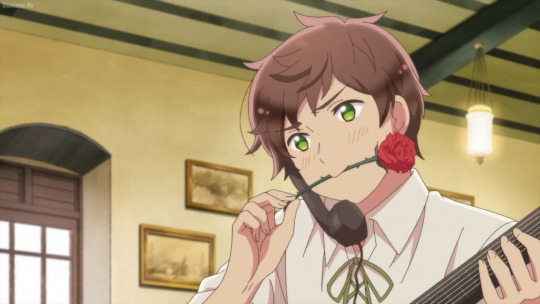
As you may have noticed, or seen in very inaccurate memes, in Spain we pronounce some words with a TH sound. But, is that considered a lisp? Well, no, since a lisp is a speech impediment. That'd be as nonsensical as saying that English speakers have a lisp because they call this (1000) number thousand, or they call the thing that shakes in the sky thunder, or that Greeks have a lisp because they have a bunch of words like thalasso.
What we have is distinción or diferenciación which is a phonemic distinction made between the sounds represented by the letters "s" and "z" (or soft "c" before "e" and "i").
How do you know how to pronounce each sound?
Za, ze, ce, zi, ci, zo, zu = TH
Sa, se, si, so, su = S
(so, no, we don't pronounce sí like "thí", or España like "Ethpaña" as some may have you believe)
This is actually very useful when writing because we know exactly whether we should write a word with a Z or an S depending on how it sounds. Spanish speakers of other dialects may get confused when they learn how to write as children, as they have to memorise if words are written with Z or S. We don't need to do that.
It's also useful when telling apart two words that sound very similar. For example:
"Casa" ("house") is pronounced caSa.
"Caza" ("hunt") is pronounced with caTHa.
Does everyone in Spain speak with distinción / diferenciación?
No! As you can see in the map below, even though most people do the distinción, some people in Spain speak with seseo and some others speak with ceceo.
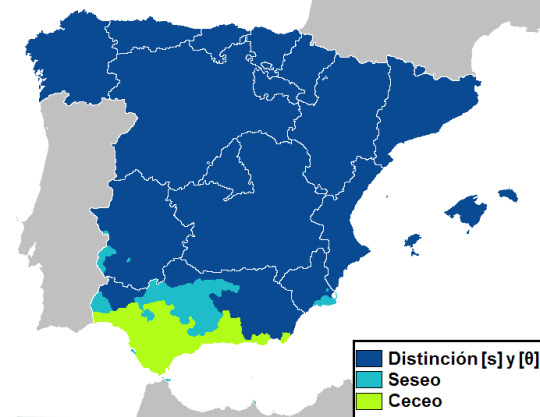
Seseo consists in pronouncing everything with a S sound. This is the characteristic found in all of the dialects in Latin America, as well as in some parts of the south of Spain and the Canary Islands (not pictured in the map, smh). So for example, they'd pronounce "zapato" ("shoe") as sapato.
Ceceo is the opposite of seseo, so, pronouncing everything with a TH sound. This is also found in the south of Spain. People who do ceceo would typically pronounce a word like "sandía" ("watermelon") as thandía.
So, is ceceo a lisp? Still, no. Most people who speak with ceceo are able to switch to distinción, even if it doesn't come natural to them, so it can't be a speech impediment. In fact, a lot of them are more or less forced to, especially if they move out of the southern regions, as people who speak with ceceo are stereotypically regarded as dumb and unprofessional and are usually the target of classist jokes.
European Spanish (especially the southern/Andalusian dialect) is so diverse when it comes to phonetics and vocabulary, that even within the same city or town you'll find people who pronounce things differently. Which means, not every inhabitant of the part of the map colored as "ceceo" is going to speak with ceceo.
For example, this is the data of three cities in the south, when studying if people do ceceo, seseo or distinción:

I personally spoke with ceceo as a child, as I learned how to talk in a town where people do that, but I was corrected out of it because of concerns regarding the stereotype I just told you. It slips from time to time but I mostly speak with diferenciación now.
Now that I've explained all of this, you probably already know how we'd pronounce the word "distinción", right? It's diStinTHión.
So which accent would Hetalia's Spain have?
Unlike characters like Romano, we don't know which part of the country Spain would be from, so we cannot know which specific dialect he speaks. In the official Spanish dub he does speak with distinción but that's because dubs are usually done in Madrid's accent (which is considered to be the "neutral" one).
If you want to go the safe route, I'd say distinción is the way, since it can be found even in cities where ceceo or seseo predominate. Unless he was from the Canary Island: there's no way he'd speak with other than seseo then.
If you're doing fan work it's very unlikely that you have to use any of these phonetics anyways, since most content is done in English. The point of my explanation is mostly to let you know that:
no, Spaniards don't have a lisp.
there's no such thing as just one "Spanish from Spain" dialect.
mocking people who do the TH sound is actually classist and very uncool.
That's all for today! If you have any questions please let me know :)
#2 educational posts in a row damn i feel like a teacher#hws#hws spain#aph#aph spain#hetalia#antonio fernandez carriedo#spanish#european spanish#spanish from spain#ceceo#seseo
22 notes
·
View notes
Note
i saw your tags on that one post about fanfic dialogue and i locked tf in immediately so can you pls tell me about kingsley's speech patterns? :)
Of COURSE I can!
So, of our 3 purple tiefling iterations, Lucien sounds the most different, bc he’s voiced by Matt, and using a stronger accent. This actually works, I think, bc Lucien had a lot more history, and we know from Molly’s comic that he basically had to learn to speak again, so it follows that he’d only retain a touch of Lucien’s accent. The difference between Molly and Kingsley, however, is interesting to me.
The thing about Molly is, he talks incredibly fast. This is there from the jump, he rambles his introduction so quick that Tal slips on his NAME, that’s how fast he talks. It’s a showmanship thing, a carnival barker type thing, and it works for someone who “grew up” in the circus.
While Kingsley retains more from Molly than Molly does from Lucien, he speaks at a much more measured pace. Like Molly, he doesn’t frequently use filler words (compared to Caduceus, who says “um/uh/yeah” a whole lot to fill space when he’s thinking—and of course Cad talks to slowest of all Tal’s characters) but he also doesn’t ramble as much as Molly.
So the interesting thing about writing dialogue for characters is that tone/pitch/accent/other audible effects aren’t there. Sure, you can describe a character’s voice, but for fic, we all know what they sound like, so a character’s voice is more based on cadence and word choice. THEREFORE: Kingsley sometimes ‘sounds’ more like Ashton when I write them, because his pace of speaking is similar to Ashton’s—the only difference is Ashton uses more filler words (usually swearing) and occasionally drops understood nouns. I only realized this when I wrote Kingsley and Ash interacting!
I think another big reason for that similarity is that although actors modify a lot for their performances, in extended improv acting like dnd it’s hard to change your vocabulary. Ashton just swears a lot more than Kingsley, because no other character has as intimate and long-standing a relationship with the word ‘fuck’ as Ashton Greymoore.
When writing, that difference in pace gets displayed by more description or dialogue tags within a line of dialogue, so the reader mentally takes a breath. Molly has very little of that when he really gets going—he talks for long sections at a time without breaks, because he’s not taking a breath. On the opposite end, caduceus tends to have full lines of description/mental narrative in the middle of his dialogue bc he pauses longer, bc he’s thinking a hell of a lot more than Mollymauk
This isn’t always the case, of course, because that would make for a very monotone fic, but it’s often enough that I could find a good deal of examples! Fortunately or not, the only dialogue-heavy thing I’ve written all three of them doing is seducing Caleb Widogast. So that’s what these all are.
Molly:
“My dear, I am an awful roommate, but I am not in the habit of laying stark-naked on the bedcovers and getting myself off while looking at the only other person in the room when I don’t intend to fuck him.”
“I want you. I always want you, anything you want to give me. Hells, if you decided to bend me over the cart and have me during the middle of a watch in front of whatever bandits came sneaking up on us, I’d let you.”
“Most of them, yes. There was a fellow in the circus—he was tattooed on every inch of his body and, excepting the areas he couldn’t possibly have reached, he did a majority of them himself. I told him if he wanted more canvas space I would gladly oblige— oh, fuck—“
Kingsley:
“Gotta warn you, if you brought me here for magical research, you’ll be disappointed,” Kingsley said.
"Let's get a fuckin' drink," Kingsley said. "I'm going to need a strong one to manage this place."
"Ah-ah-ah." Kingsley's tail insinuated itself between Caleb's legs, looping around his calf. "You’re not getting away without telling me that story."
Ashton:
“I can also be your pet theory if you want,” Ashton said, blaming the extra stupidity on headache plus horny somehow.
“I don’t care either way,” Ashton said. “I’m not particularly squeamish about being naked.”
“Holy shit, fuck me,” Ashton said, fully aloud.
For comparison, Caduceus talking with Caleb about physical intimacy (Caleb brushing his fur):
“I’m not. I’m very comfortable, actually.” He settled back in, watching Caleb with a soft smile. “I like this.”
“That’s nice.” Caduceus leaned his head against Caleb’s leg. “That’s really nice. Let’s just be together, as close as you want to be.”
“I’m probably shedding a bit.” The Menagerie Coast and even Xhorhas were warmer than the Greying Wildlands. “As long as it doesn’t bother you, that’s fine. Probably needed a deep clean.”
#critical role#what this says about me is that I like to listen to One Guy talk a LOT#……jk I also do this with Liam characters it’s more than one guy#oh and I guess it also says Caleb Widogast is the fandom bicycle ever#this has nothing about Percy because I don’t know that guy
21 notes
·
View notes
Text
Behind the OC: Nui Yoshikane
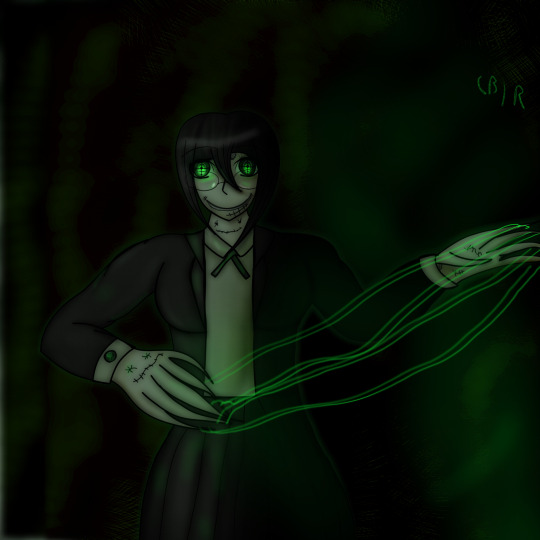
Nui Yoshikane.
Probably my most popular OC, all of you loved Nui. To my surprise too, considering that her character isn't that remarkable. But I am happy you liked her anyway. And because of this, since Nui is officially over a year old, I decided to make this post. To explain the character's creation process and the many changes that they went through.
I hope you'll enjoy it. ^^
Origin
Now, why did I create her? Well, you see a year ago I was planning a new fanfic. One where Tsumugi would wake up after the death and find herself in a non-despair universe with her classmates and herself attending Hope's Peak Academy. With none of them remembering anything from their time of the game.
Given that the story was supposed to be as mind-screwing and ambiguous than the actual V3 game, I knew I needed to add something to distort the truth even further.
And what better way to confuse Tsumugi, is by meeting herself? Or someone that looks oddly familiar to her, in a way.
And that's, how I decided to create the OC who would be in the future known as Nui Yoshikane.
Creation Process
When I created Nui, I was inspired by a certain character from a series that I just got into, around last year. Said series inspired me to write the above aforementioned fic to begin with.
I am talking about the series "Don't Hug Me I'm Scared." And the character I am referring to, is her.
Lesley. (Spoilers below)
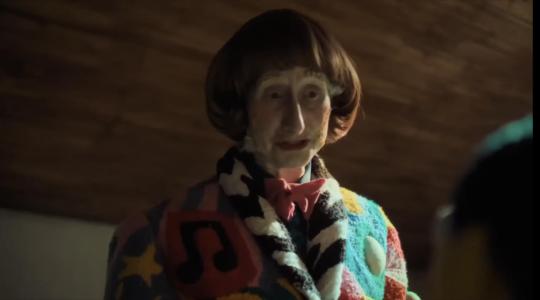
The moment I saw her, I was obsessed with the character for a variety of reasons. One, her demeanor was so oddly comforting and I especially loved that accent of hers (Not sure if it's a British one, considering the actress of the character is welsh. Oh well.)
Either way, when I created Nui, I wanted to go for a similar character concept. Someone who takes Tsumugi's faux kindness up to the max, which would make her even creepier. The stitches on Nui's face are also a reference to Lesley in that regard.
Another inspiration for Nui's character, was the Beldam from Coraline.
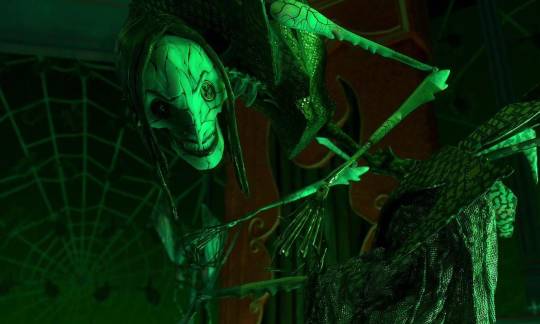
In general, the sewing motif and her status as a seamstress, were inspired by the Beldam in that regard. Her pale skin and darker clothing colors were also inspired by the Beldam, especially her true form as seen above.
Another thing that was inspired by the Beldam regarding Nui's character, where the needle hands. I gave Nui some very thin and long fingers and sharp nails, to give her more of a terrifying look. And to tie in with the sewing motif.
The last character who inspired Nui Yoshikane, is a somewhat surprising choice. But that inspiration was none other than "The Most".
I am talking about Wally Darling.
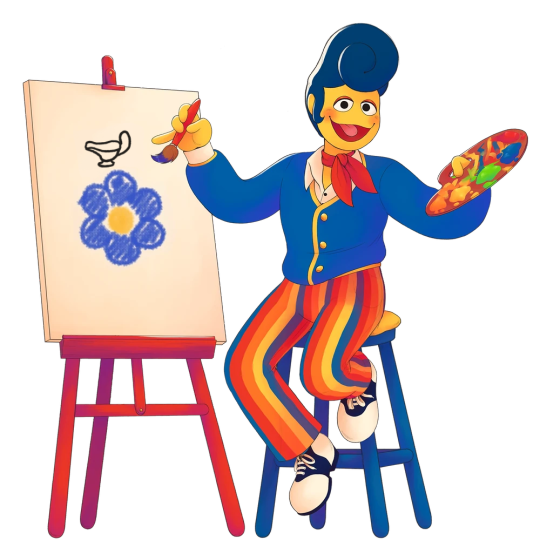
When I first learned of Welcome Home, Wally Darling stuck to me. His friendly nature and yet his off-putting behavior on the Welcome Home Website instantly made me fall in love with him, as a character.
Due to this, Nui's slow and monotone speech pattern, her curious and almost child-like demeanor. And the general affable demeanor. Of course, since Welcome Home is still ongoing, Wally may develop differently and I am excited to see, how his character will develop.
But I digress. Those were the three main inspirations for Nui's character. Let's go over the design process.
Design
When I designed Nui, my major inspiration was her beta design. In particular this one right here, created by Nona Nightingale.

Her more subdued and darker colors really fit well and I decided to base Nui's design off that beta design. Of course, I couldn't copy it 1 to 1 for obvious reasons, so I went on and tried to work on some different designs for Nui.
And believe me, she went through a lot of changes.

This was one of the first sketches for Nui's character. As you can see, she had a lot more stitches and had a much more disturbing overall appearance. I scrapped the design in the end, because it was just too terrifying and because I wanted Nui to look a bit friendly, if not a tad uncanny. So, I made another sketch.
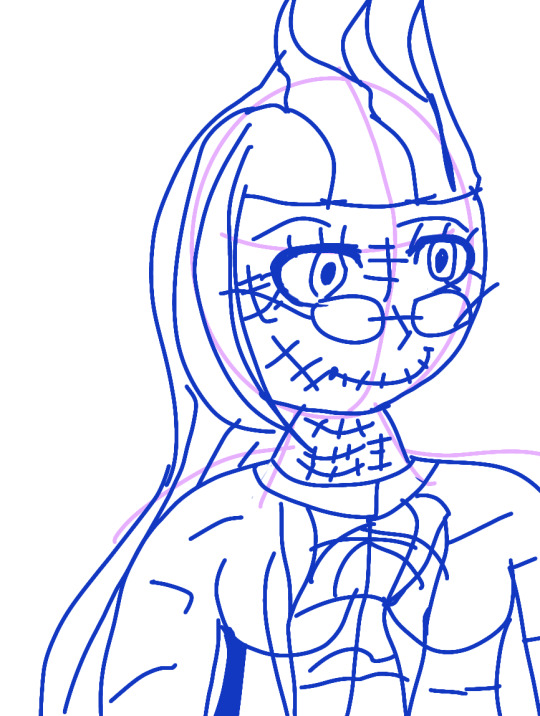
This beta designs, does look a bit more similar to the final product. But again, I was not satisfied with the hair because I wanted to give her a bit more of a sophisticated look. So, I moved on to her first "official" design.
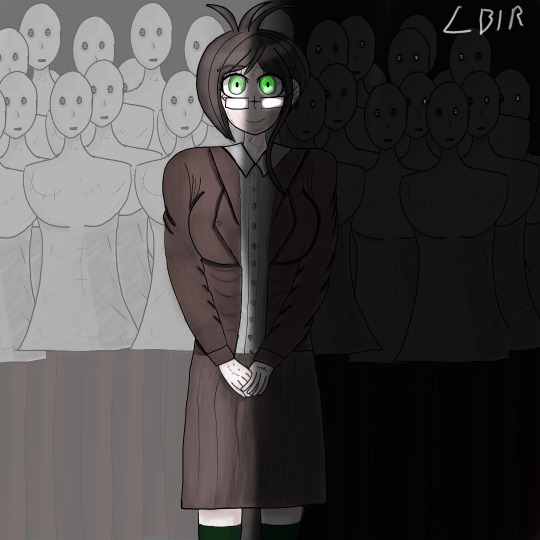
Here's another earlier design of Nui. You can see that unlike the final product, she lacks her green bow tie and her skin is much shorter. Not only that, but the stitches are less noticeable and her overall appearance is a lot less creepy than in the final product. So, I revised yet again.
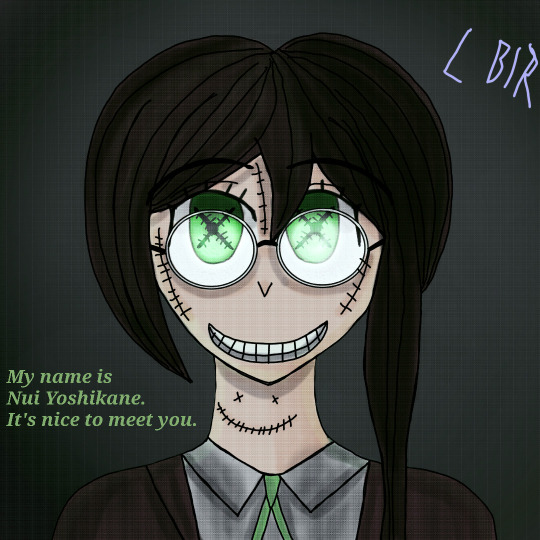
This design for Nui looks very similar to the final product. As you can see, the stitches are a lot more pronounced and the crossed eyes are vertical and not horizontal, unlike the final version. I was initially happy with Nui's designs, but eventually I gave her a different design yet again.
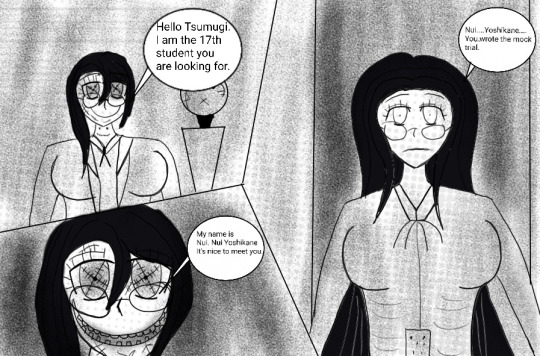
In this comic that I drew based on the fic where she first appeared in "Welcome To your Paradise", I changed Nui's design a bit more, to reflect her final appearance. However the crosses are still vertical and her blazer is much more lighter, than in the final version.
Now then. This next one was a commission I bought from the lovely @waveglox back in May, I believe. They drew Nui extremely well with a good price and I recommend you, to check their account out. Because they are an incredible artist and a huge inspiration of mine.
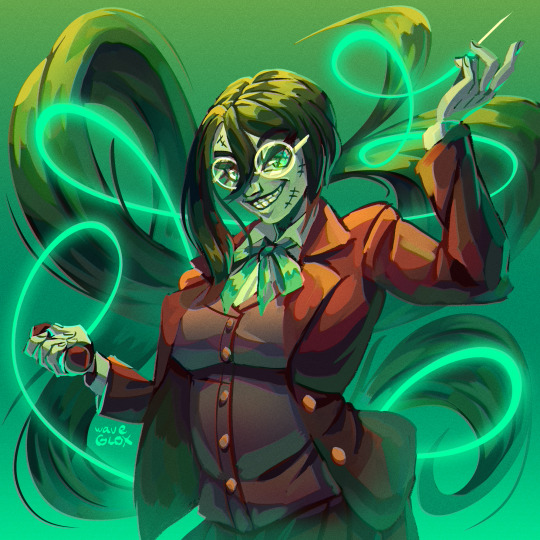
Incredible, isn't it? I jsut love this comission so much and although her hair is a lot longer than in the final version, I am still very happy about it and think her design is absolutely awesome.
But of course, I changed it yet again.

This design looks extremely familiar and simmilar to the final product and the only thing that's different is the overall anatomy and the fact that she looks a lot thinner. But I wasn't satisfied with that design either, so....
This, is her present design

As you can see here, I made the blazer much much darker and I also made the stitches in her eyes horizontal, while giving her a bit of a paler color. And I decided to make the stitches on her neck reflect her current mood. Because, why not?
I am personally happy with the design, since it reflects everything I envisioned about her character. Creepy, yet polite and friendly. However the other versions of Nui's designs, were based on some earlier character concepts of hers. Which leads me to:
Personality and Mannerisms
Originally, Nui was conceived as a pure villainous character. One that would be similar to Junko Enoshima in some aspects, like a faux-affably evil persona and a general manipulative nature. However, as time went on, I decided to flesh her out more. Because I wanted her to be much more complex. Which is why, I added the following.
As I mentioned previously, Nui was inspired by The Beldam from Coraline. In order to differentiate her more from her, I made Nui extremely protective and caring towards children. She would never hurt them and actively hurts those, who harm and endanger children in any malicious way.
Another thing I added, was to make her a bit more dorky. For that, I decided to give her a pianist hobby. But unlike Kaede, Nui's piano skills range from atrocious to just abysmal. Not only that, but I also gave her an affinity for tea. Because Nui's overall appearance was supposed to give off the vibes of a British Lady, sophisticated and polite. To contrast with Junko's hammy and vulgar personality.
Also, when I fleshed her out a bit more, I also gave her a habit of her humming and singing. Something she is a bit better at than playing the piano, but not by much.
The last quirk I added, was that she likes to sew all kinds of stuff. Originally, her specialty was only supposed to be in crafting clothing for dolls, but then I made her more of a general sewing specialist, ranging from fixing clothing and making sweaters among other things.
Other Inspirations
Nui's character is partially based on the concept, of Liminal Spaces. By that I mean, is that she is supposed to give of a familiar and harmless, yet overall strange feeling.
Like...something is off. But you cannot put your finger on it. For this, I even made a Spotify playlist for her, which you can view here.
Lastly, I wanna stress that Nui is not 100% human. What is she really?
You'd love to know that....wouldn't you?
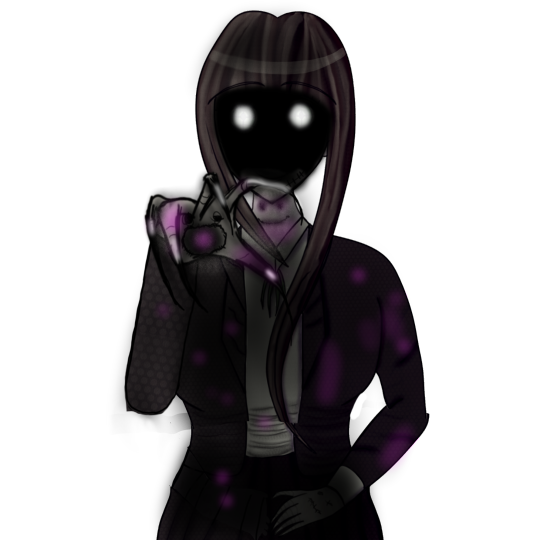
Closing Thoughts
Overall, to say that Nui developed this much over the entire year surprised me. But it does show, how characters can go through a variety of changes, before settling in on their final form. Whether Nui will go through other changes is unknown as of now, but I hope you will stick around.
Lastly, here is some of Nui's voice. Enjoy ^^
Listen.
Thank you for reading and have a good day!
#danganronpa v3#danganronpa killing harmony#danganronpa v3 killing harmony#danganronpa art#danganronpa fanfiction#danganronpa oc#sammylbir#nui yoshikane#danganronpa plasmaverse#plasmaverse
24 notes
·
View notes